Entrepreneurship & Small Business Management: A Detailed Report
VerifiedAdded on 2023/02/02
|19
|5445
|54
Report
AI Summary
This report provides a comprehensive analysis of entrepreneurship and small business management, focusing on various types of entrepreneurial ventures and their related typologies. It explores the similarities and differences between ventures such as social, small, large, and start-up businesses, emphasizing the effective utilization of resources to achieve targeted goals. The report assesses the impact of small and micro businesses on the UK economy, including their contribution to employment creation, infrastructure development, and regional and national economic growth, particularly in the context of Brexit. Furthermore, it discusses the characteristics, traits, and skills of successful entrepreneurs, differentiating them from managers, and examines how background and experience can either hinder or foster entrepreneurship. The document concludes by highlighting the critical role of small businesses in driving economic development and social progress.

ENTREPRENEURSHIP AND
SMALL BUSINESS
MANAGEMENT
SMALL BUSINESS
MANAGEMENT
Paraphrase This Document
Need a fresh take? Get an instant paraphrase of this document with our AI Paraphraser
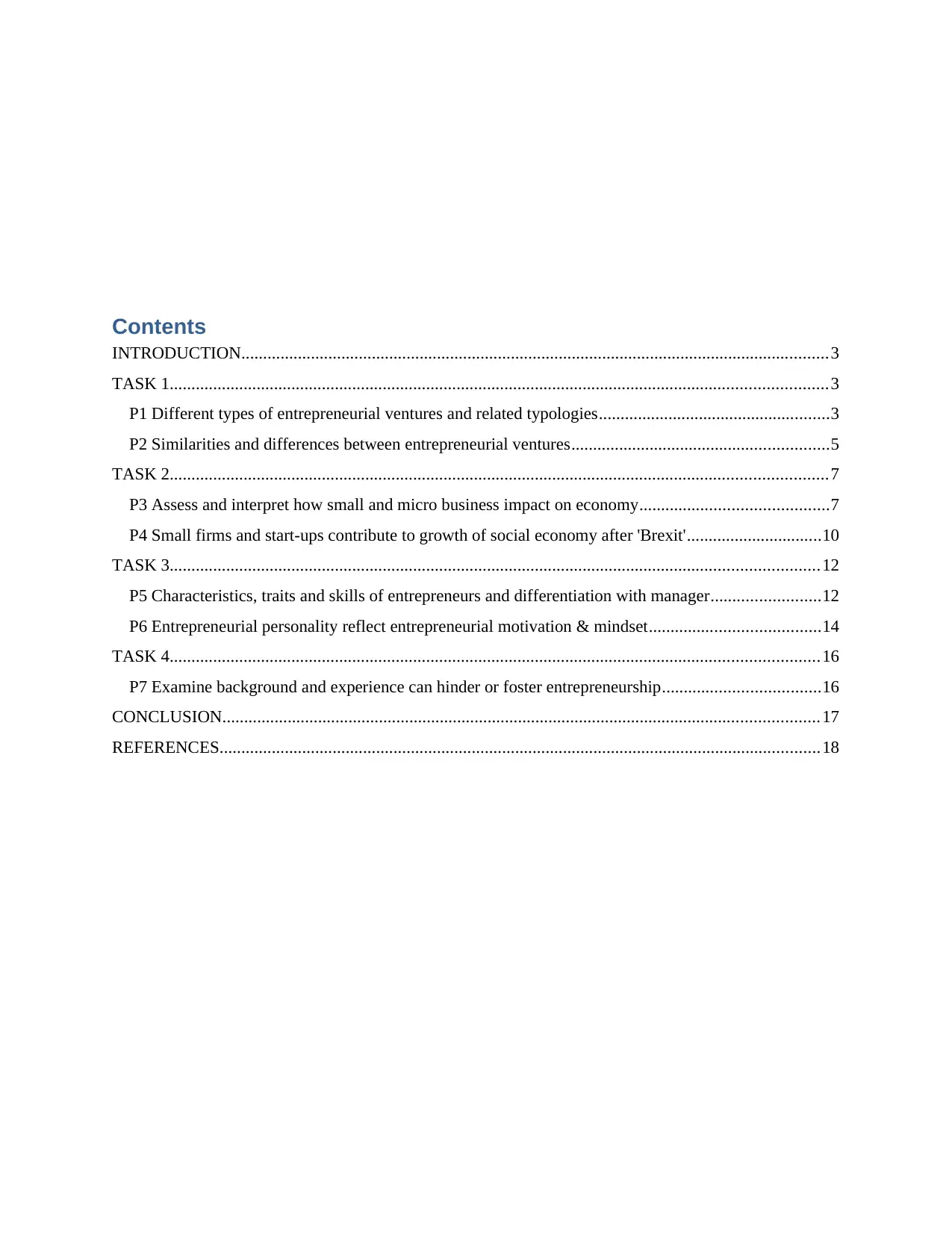
Contents
INTRODUCTION.......................................................................................................................................3
TASK 1.......................................................................................................................................................3
P1 Different types of entrepreneurial ventures and related typologies.....................................................3
P2 Similarities and differences between entrepreneurial ventures...........................................................5
TASK 2.......................................................................................................................................................7
P3 Assess and interpret how small and micro business impact on economy...........................................7
P4 Small firms and start-ups contribute to growth of social economy after 'Brexit'...............................10
TASK 3.....................................................................................................................................................12
P5 Characteristics, traits and skills of entrepreneurs and differentiation with manager.........................12
P6 Entrepreneurial personality reflect entrepreneurial motivation & mindset.......................................14
TASK 4.....................................................................................................................................................16
P7 Examine background and experience can hinder or foster entrepreneurship....................................16
CONCLUSION.........................................................................................................................................17
REFERENCES..........................................................................................................................................18
INTRODUCTION.......................................................................................................................................3
TASK 1.......................................................................................................................................................3
P1 Different types of entrepreneurial ventures and related typologies.....................................................3
P2 Similarities and differences between entrepreneurial ventures...........................................................5
TASK 2.......................................................................................................................................................7
P3 Assess and interpret how small and micro business impact on economy...........................................7
P4 Small firms and start-ups contribute to growth of social economy after 'Brexit'...............................10
TASK 3.....................................................................................................................................................12
P5 Characteristics, traits and skills of entrepreneurs and differentiation with manager.........................12
P6 Entrepreneurial personality reflect entrepreneurial motivation & mindset.......................................14
TASK 4.....................................................................................................................................................16
P7 Examine background and experience can hinder or foster entrepreneurship....................................16
CONCLUSION.........................................................................................................................................17
REFERENCES..........................................................................................................................................18
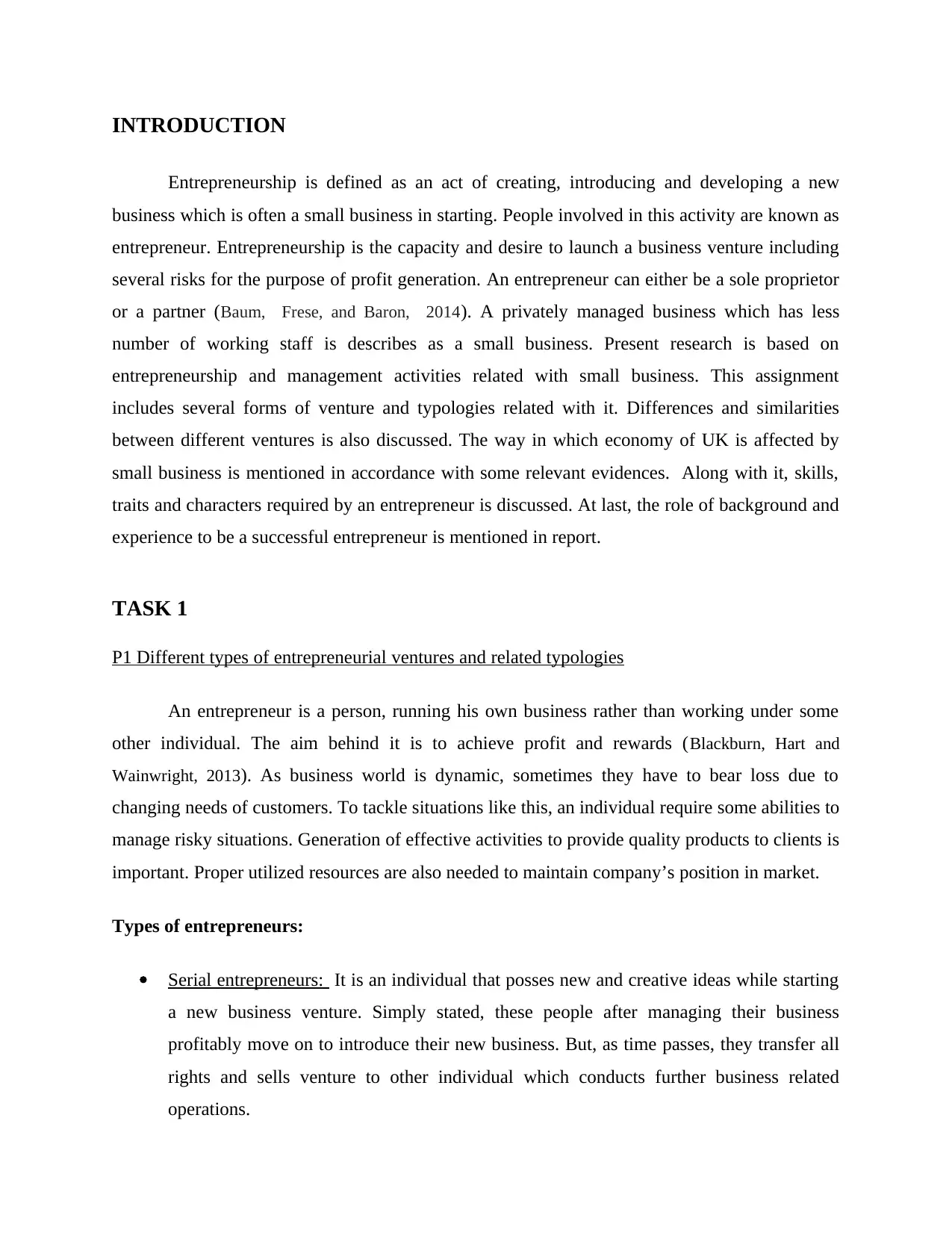
INTRODUCTION
Entrepreneurship is defined as an act of creating, introducing and developing a new
business which is often a small business in starting. People involved in this activity are known as
entrepreneur. Entrepreneurship is the capacity and desire to launch a business venture including
several risks for the purpose of profit generation. An entrepreneur can either be a sole proprietor
or a partner (Baum, Frese, and Baron, 2014). A privately managed business which has less
number of working staff is describes as a small business. Present research is based on
entrepreneurship and management activities related with small business. This assignment
includes several forms of venture and typologies related with it. Differences and similarities
between different ventures is also discussed. The way in which economy of UK is affected by
small business is mentioned in accordance with some relevant evidences. Along with it, skills,
traits and characters required by an entrepreneur is discussed. At last, the role of background and
experience to be a successful entrepreneur is mentioned in report.
TASK 1
P1 Different types of entrepreneurial ventures and related typologies
An entrepreneur is a person, running his own business rather than working under some
other individual. The aim behind it is to achieve profit and rewards (Blackburn, Hart and
Wainwright, 2013). As business world is dynamic, sometimes they have to bear loss due to
changing needs of customers. To tackle situations like this, an individual require some abilities to
manage risky situations. Generation of effective activities to provide quality products to clients is
important. Proper utilized resources are also needed to maintain company’s position in market.
Types of entrepreneurs:
Serial entrepreneurs: It is an individual that posses new and creative ideas while starting
a new business venture. Simply stated, these people after managing their business
profitably move on to introduce their new business. But, as time passes, they transfer all
rights and sells venture to other individual which conducts further business related
operations.
Entrepreneurship is defined as an act of creating, introducing and developing a new
business which is often a small business in starting. People involved in this activity are known as
entrepreneur. Entrepreneurship is the capacity and desire to launch a business venture including
several risks for the purpose of profit generation. An entrepreneur can either be a sole proprietor
or a partner (Baum, Frese, and Baron, 2014). A privately managed business which has less
number of working staff is describes as a small business. Present research is based on
entrepreneurship and management activities related with small business. This assignment
includes several forms of venture and typologies related with it. Differences and similarities
between different ventures is also discussed. The way in which economy of UK is affected by
small business is mentioned in accordance with some relevant evidences. Along with it, skills,
traits and characters required by an entrepreneur is discussed. At last, the role of background and
experience to be a successful entrepreneur is mentioned in report.
TASK 1
P1 Different types of entrepreneurial ventures and related typologies
An entrepreneur is a person, running his own business rather than working under some
other individual. The aim behind it is to achieve profit and rewards (Blackburn, Hart and
Wainwright, 2013). As business world is dynamic, sometimes they have to bear loss due to
changing needs of customers. To tackle situations like this, an individual require some abilities to
manage risky situations. Generation of effective activities to provide quality products to clients is
important. Proper utilized resources are also needed to maintain company’s position in market.
Types of entrepreneurs:
Serial entrepreneurs: It is an individual that posses new and creative ideas while starting
a new business venture. Simply stated, these people after managing their business
profitably move on to introduce their new business. But, as time passes, they transfer all
rights and sells venture to other individual which conducts further business related
operations.
⊘ This is a preview!⊘
Do you want full access?
Subscribe today to unlock all pages.

Trusted by 1+ million students worldwide
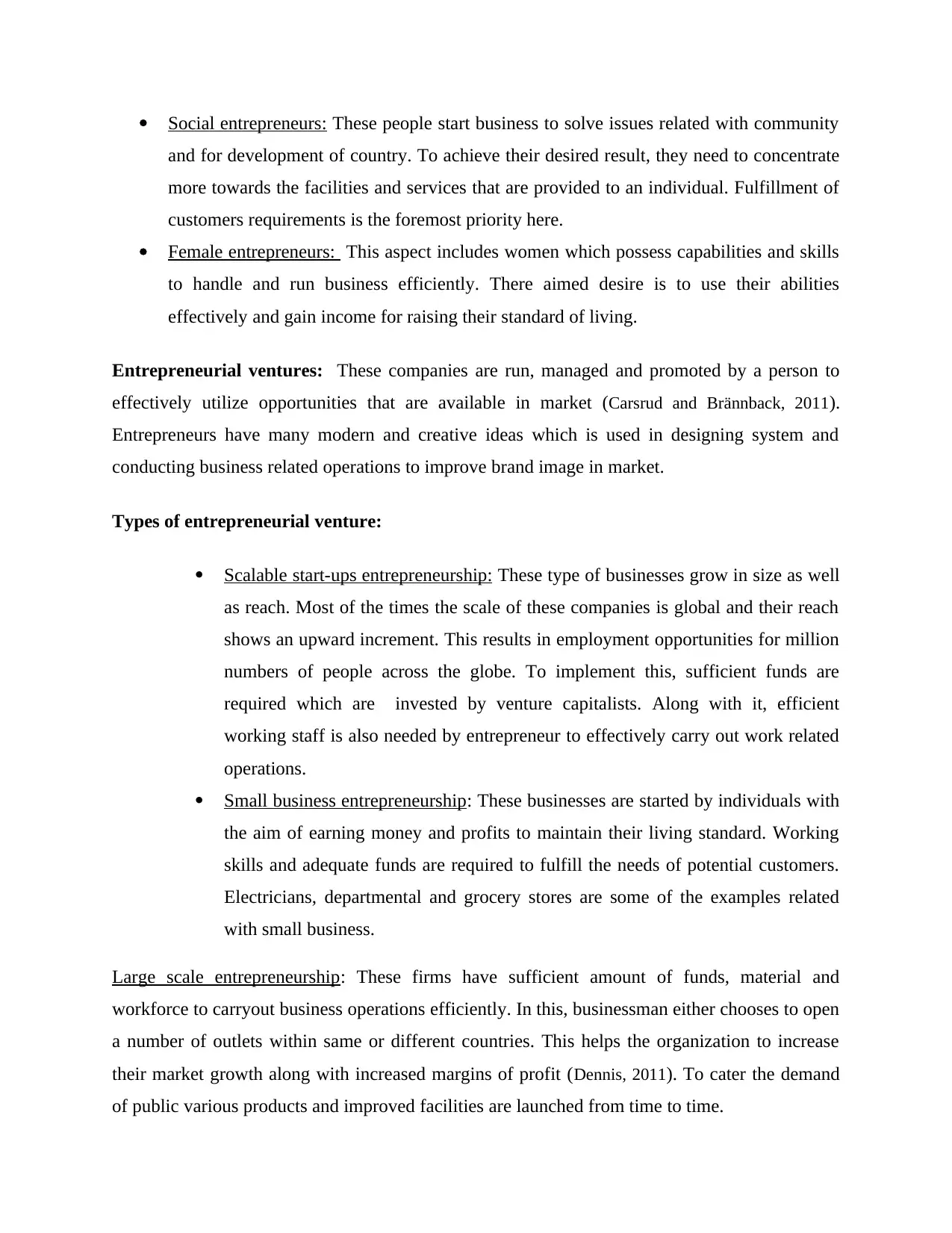
Social entrepreneurs: These people start business to solve issues related with community
and for development of country. To achieve their desired result, they need to concentrate
more towards the facilities and services that are provided to an individual. Fulfillment of
customers requirements is the foremost priority here.
Female entrepreneurs: This aspect includes women which possess capabilities and skills
to handle and run business efficiently. There aimed desire is to use their abilities
effectively and gain income for raising their standard of living.
Entrepreneurial ventures: These companies are run, managed and promoted by a person to
effectively utilize opportunities that are available in market (Carsrud and Brännback, 2011).
Entrepreneurs have many modern and creative ideas which is used in designing system and
conducting business related operations to improve brand image in market.
Types of entrepreneurial venture:
Scalable start-ups entrepreneurship: These type of businesses grow in size as well
as reach. Most of the times the scale of these companies is global and their reach
shows an upward increment. This results in employment opportunities for million
numbers of people across the globe. To implement this, sufficient funds are
required which are invested by venture capitalists. Along with it, efficient
working staff is also needed by entrepreneur to effectively carry out work related
operations.
Small business entrepreneurship: These businesses are started by individuals with
the aim of earning money and profits to maintain their living standard. Working
skills and adequate funds are required to fulfill the needs of potential customers.
Electricians, departmental and grocery stores are some of the examples related
with small business.
Large scale entrepreneurship: These firms have sufficient amount of funds, material and
workforce to carryout business operations efficiently. In this, businessman either chooses to open
a number of outlets within same or different countries. This helps the organization to increase
their market growth along with increased margins of profit (Dennis, 2011). To cater the demand
of public various products and improved facilities are launched from time to time.
and for development of country. To achieve their desired result, they need to concentrate
more towards the facilities and services that are provided to an individual. Fulfillment of
customers requirements is the foremost priority here.
Female entrepreneurs: This aspect includes women which possess capabilities and skills
to handle and run business efficiently. There aimed desire is to use their abilities
effectively and gain income for raising their standard of living.
Entrepreneurial ventures: These companies are run, managed and promoted by a person to
effectively utilize opportunities that are available in market (Carsrud and Brännback, 2011).
Entrepreneurs have many modern and creative ideas which is used in designing system and
conducting business related operations to improve brand image in market.
Types of entrepreneurial venture:
Scalable start-ups entrepreneurship: These type of businesses grow in size as well
as reach. Most of the times the scale of these companies is global and their reach
shows an upward increment. This results in employment opportunities for million
numbers of people across the globe. To implement this, sufficient funds are
required which are invested by venture capitalists. Along with it, efficient
working staff is also needed by entrepreneur to effectively carry out work related
operations.
Small business entrepreneurship: These businesses are started by individuals with
the aim of earning money and profits to maintain their living standard. Working
skills and adequate funds are required to fulfill the needs of potential customers.
Electricians, departmental and grocery stores are some of the examples related
with small business.
Large scale entrepreneurship: These firms have sufficient amount of funds, material and
workforce to carryout business operations efficiently. In this, businessman either chooses to open
a number of outlets within same or different countries. This helps the organization to increase
their market growth along with increased margins of profit (Dennis, 2011). To cater the demand
of public various products and improved facilities are launched from time to time.
Paraphrase This Document
Need a fresh take? Get an instant paraphrase of this document with our AI Paraphraser
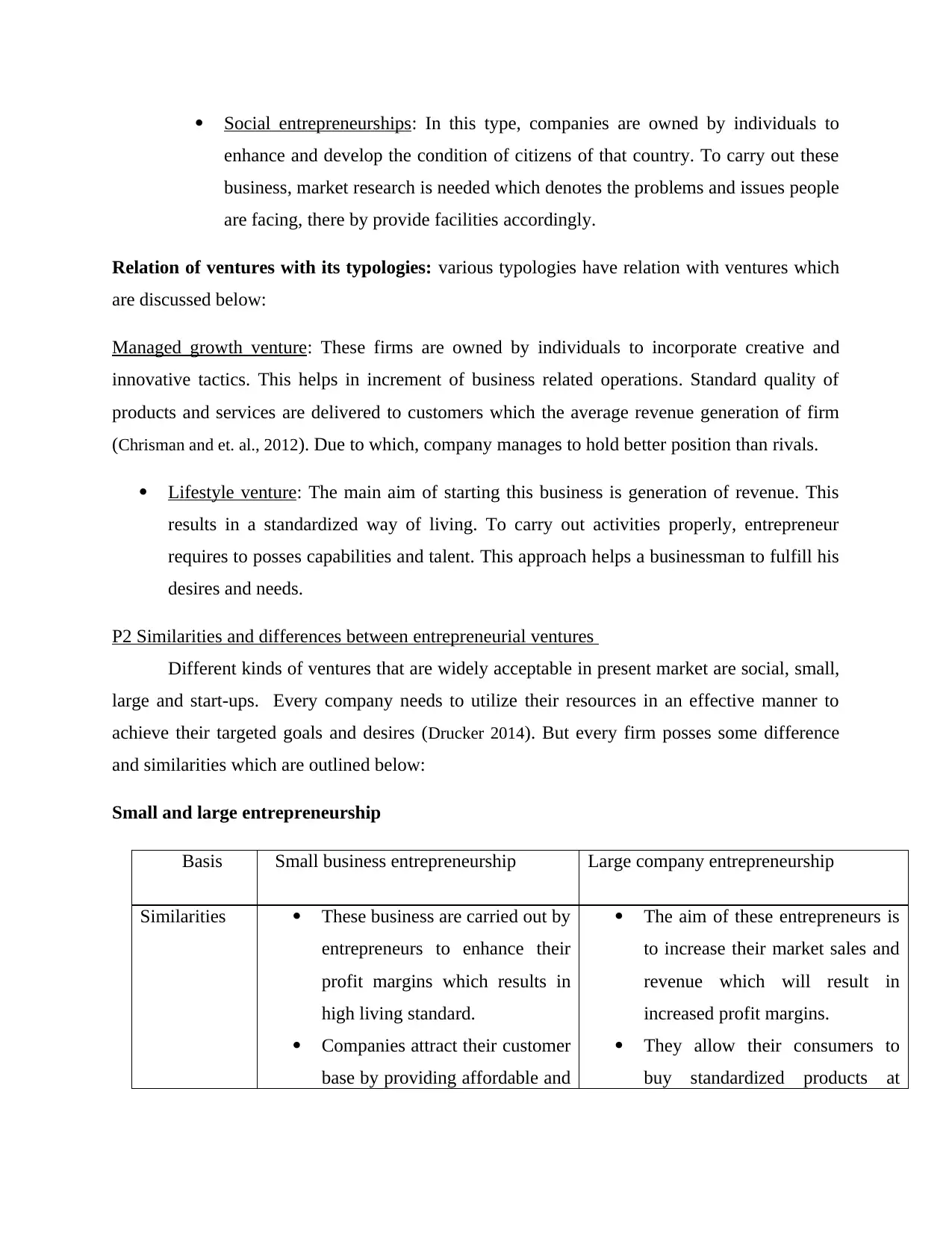
Social entrepreneurships: In this type, companies are owned by individuals to
enhance and develop the condition of citizens of that country. To carry out these
business, market research is needed which denotes the problems and issues people
are facing, there by provide facilities accordingly.
Relation of ventures with its typologies: various typologies have relation with ventures which
are discussed below:
Managed growth venture: These firms are owned by individuals to incorporate creative and
innovative tactics. This helps in increment of business related operations. Standard quality of
products and services are delivered to customers which the average revenue generation of firm
(Chrisman and et. al., 2012). Due to which, company manages to hold better position than rivals.
Lifestyle venture: The main aim of starting this business is generation of revenue. This
results in a standardized way of living. To carry out activities properly, entrepreneur
requires to posses capabilities and talent. This approach helps a businessman to fulfill his
desires and needs.
P2 Similarities and differences between entrepreneurial ventures
Different kinds of ventures that are widely acceptable in present market are social, small,
large and start-ups. Every company needs to utilize their resources in an effective manner to
achieve their targeted goals and desires (Drucker 2014). But every firm posses some difference
and similarities which are outlined below:
Small and large entrepreneurship
Basis Small business entrepreneurship Large company entrepreneurship
Similarities These business are carried out by
entrepreneurs to enhance their
profit margins which results in
high living standard.
Companies attract their customer
base by providing affordable and
The aim of these entrepreneurs is
to increase their market sales and
revenue which will result in
increased profit margins.
They allow their consumers to
buy standardized products at
enhance and develop the condition of citizens of that country. To carry out these
business, market research is needed which denotes the problems and issues people
are facing, there by provide facilities accordingly.
Relation of ventures with its typologies: various typologies have relation with ventures which
are discussed below:
Managed growth venture: These firms are owned by individuals to incorporate creative and
innovative tactics. This helps in increment of business related operations. Standard quality of
products and services are delivered to customers which the average revenue generation of firm
(Chrisman and et. al., 2012). Due to which, company manages to hold better position than rivals.
Lifestyle venture: The main aim of starting this business is generation of revenue. This
results in a standardized way of living. To carry out activities properly, entrepreneur
requires to posses capabilities and talent. This approach helps a businessman to fulfill his
desires and needs.
P2 Similarities and differences between entrepreneurial ventures
Different kinds of ventures that are widely acceptable in present market are social, small,
large and start-ups. Every company needs to utilize their resources in an effective manner to
achieve their targeted goals and desires (Drucker 2014). But every firm posses some difference
and similarities which are outlined below:
Small and large entrepreneurship
Basis Small business entrepreneurship Large company entrepreneurship
Similarities These business are carried out by
entrepreneurs to enhance their
profit margins which results in
high living standard.
Companies attract their customer
base by providing affordable and
The aim of these entrepreneurs is
to increase their market sales and
revenue which will result in
increased profit margins.
They allow their consumers to
buy standardized products at
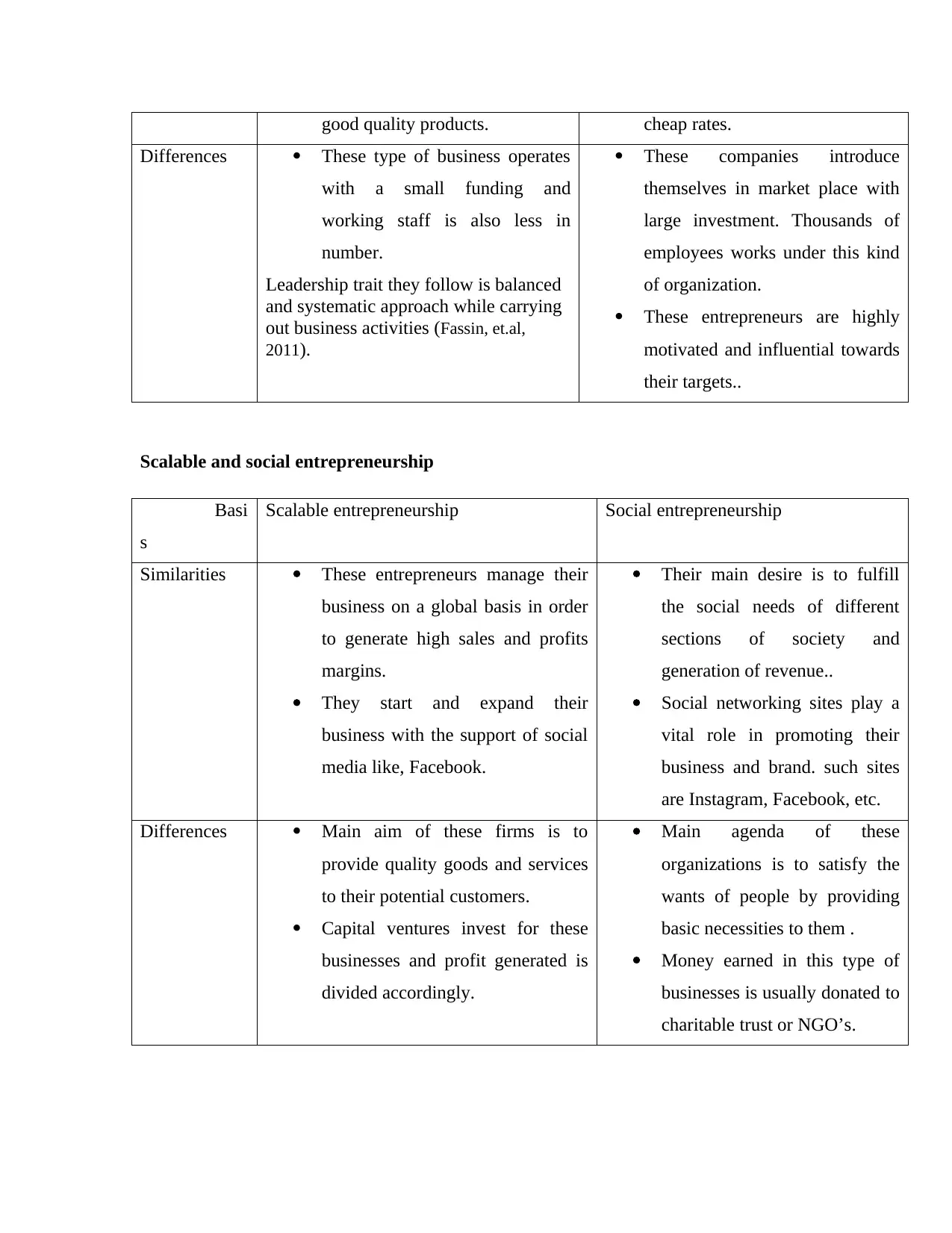
good quality products. cheap rates.
Differences These type of business operates
with a small funding and
working staff is also less in
number.
Leadership trait they follow is balanced
and systematic approach while carrying
out business activities (Fassin, et.al,
2011).
These companies introduce
themselves in market place with
large investment. Thousands of
employees works under this kind
of organization.
These entrepreneurs are highly
motivated and influential towards
their targets..
Scalable and social entrepreneurship
Basi
s
Scalable entrepreneurship Social entrepreneurship
Similarities These entrepreneurs manage their
business on a global basis in order
to generate high sales and profits
margins.
They start and expand their
business with the support of social
media like, Facebook.
Their main desire is to fulfill
the social needs of different
sections of society and
generation of revenue..
Social networking sites play a
vital role in promoting their
business and brand. such sites
are Instagram, Facebook, etc.
Differences Main aim of these firms is to
provide quality goods and services
to their potential customers.
Capital ventures invest for these
businesses and profit generated is
divided accordingly.
Main agenda of these
organizations is to satisfy the
wants of people by providing
basic necessities to them .
Money earned in this type of
businesses is usually donated to
charitable trust or NGO’s.
Differences These type of business operates
with a small funding and
working staff is also less in
number.
Leadership trait they follow is balanced
and systematic approach while carrying
out business activities (Fassin, et.al,
2011).
These companies introduce
themselves in market place with
large investment. Thousands of
employees works under this kind
of organization.
These entrepreneurs are highly
motivated and influential towards
their targets..
Scalable and social entrepreneurship
Basi
s
Scalable entrepreneurship Social entrepreneurship
Similarities These entrepreneurs manage their
business on a global basis in order
to generate high sales and profits
margins.
They start and expand their
business with the support of social
media like, Facebook.
Their main desire is to fulfill
the social needs of different
sections of society and
generation of revenue..
Social networking sites play a
vital role in promoting their
business and brand. such sites
are Instagram, Facebook, etc.
Differences Main aim of these firms is to
provide quality goods and services
to their potential customers.
Capital ventures invest for these
businesses and profit generated is
divided accordingly.
Main agenda of these
organizations is to satisfy the
wants of people by providing
basic necessities to them .
Money earned in this type of
businesses is usually donated to
charitable trust or NGO’s.
⊘ This is a preview!⊘
Do you want full access?
Subscribe today to unlock all pages.

Trusted by 1+ million students worldwide
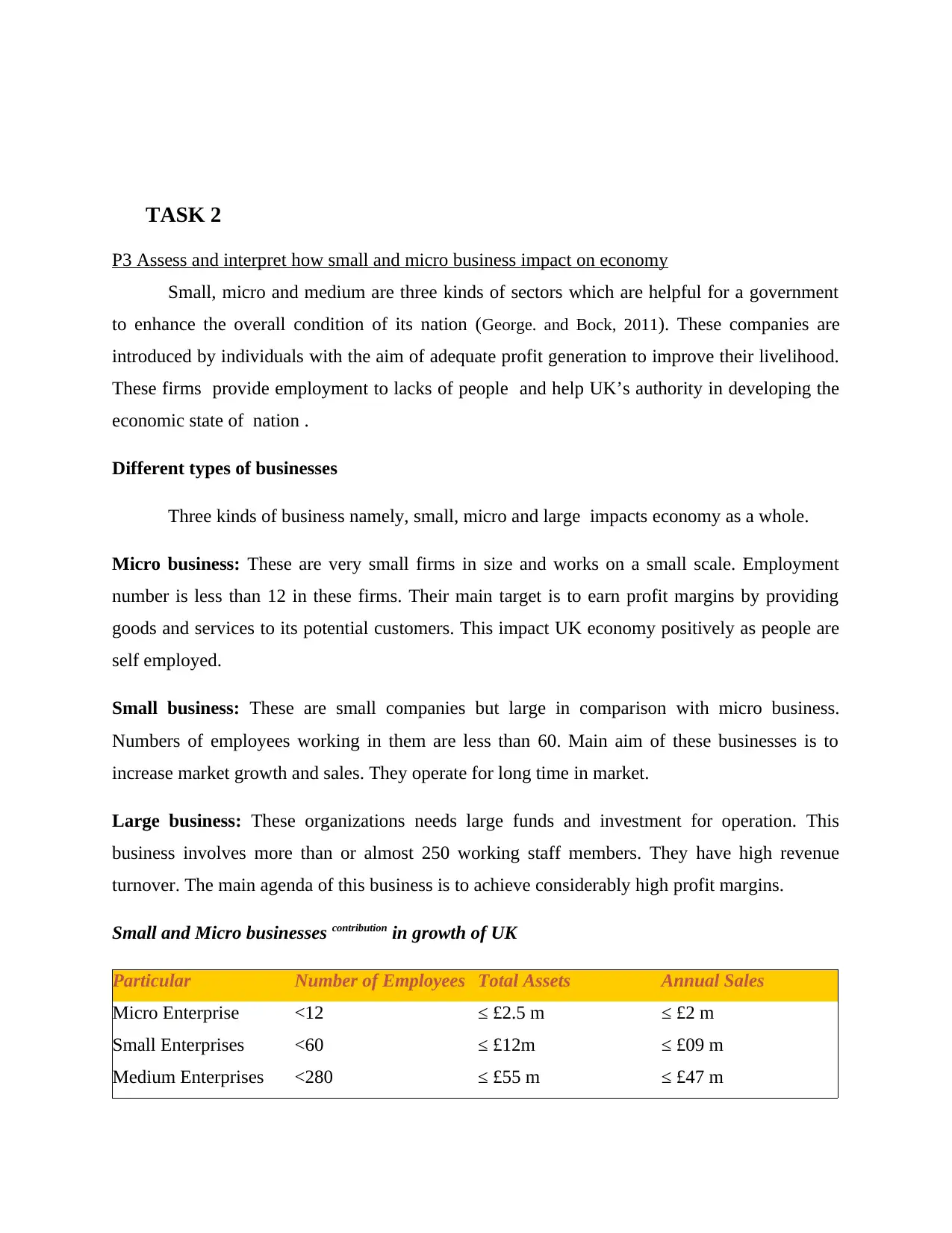
TASK 2
P3 Assess and interpret how small and micro business impact on economy
Small, micro and medium are three kinds of sectors which are helpful for a government
to enhance the overall condition of its nation (George. and Bock, 2011). These companies are
introduced by individuals with the aim of adequate profit generation to improve their livelihood.
These firms provide employment to lacks of people and help UK’s authority in developing the
economic state of nation .
Different types of businesses
Three kinds of business namely, small, micro and large impacts economy as a whole.
Micro business: These are very small firms in size and works on a small scale. Employment
number is less than 12 in these firms. Their main target is to earn profit margins by providing
goods and services to its potential customers. This impact UK economy positively as people are
self employed.
Small business: These are small companies but large in comparison with micro business.
Numbers of employees working in them are less than 60. Main aim of these businesses is to
increase market growth and sales. They operate for long time in market.
Large business: These organizations needs large funds and investment for operation. This
business involves more than or almost 250 working staff members. They have high revenue
turnover. The main agenda of this business is to achieve considerably high profit margins.
Small and Micro businesses contribution in growth of UK
Particular Number of Employees Total Assets Annual Sales
Micro Enterprise <12 ≤ £2.5 m ≤ £2 m
Small Enterprises <60 ≤ £12m ≤ £09 m
Medium Enterprises <280 ≤ £55 m ≤ £47 m
P3 Assess and interpret how small and micro business impact on economy
Small, micro and medium are three kinds of sectors which are helpful for a government
to enhance the overall condition of its nation (George. and Bock, 2011). These companies are
introduced by individuals with the aim of adequate profit generation to improve their livelihood.
These firms provide employment to lacks of people and help UK’s authority in developing the
economic state of nation .
Different types of businesses
Three kinds of business namely, small, micro and large impacts economy as a whole.
Micro business: These are very small firms in size and works on a small scale. Employment
number is less than 12 in these firms. Their main target is to earn profit margins by providing
goods and services to its potential customers. This impact UK economy positively as people are
self employed.
Small business: These are small companies but large in comparison with micro business.
Numbers of employees working in them are less than 60. Main aim of these businesses is to
increase market growth and sales. They operate for long time in market.
Large business: These organizations needs large funds and investment for operation. This
business involves more than or almost 250 working staff members. They have high revenue
turnover. The main agenda of this business is to achieve considerably high profit margins.
Small and Micro businesses contribution in growth of UK
Particular Number of Employees Total Assets Annual Sales
Micro Enterprise <12 ≤ £2.5 m ≤ £2 m
Small Enterprises <60 ≤ £12m ≤ £09 m
Medium Enterprises <280 ≤ £55 m ≤ £47 m
Paraphrase This Document
Need a fresh take? Get an instant paraphrase of this document with our AI Paraphraser
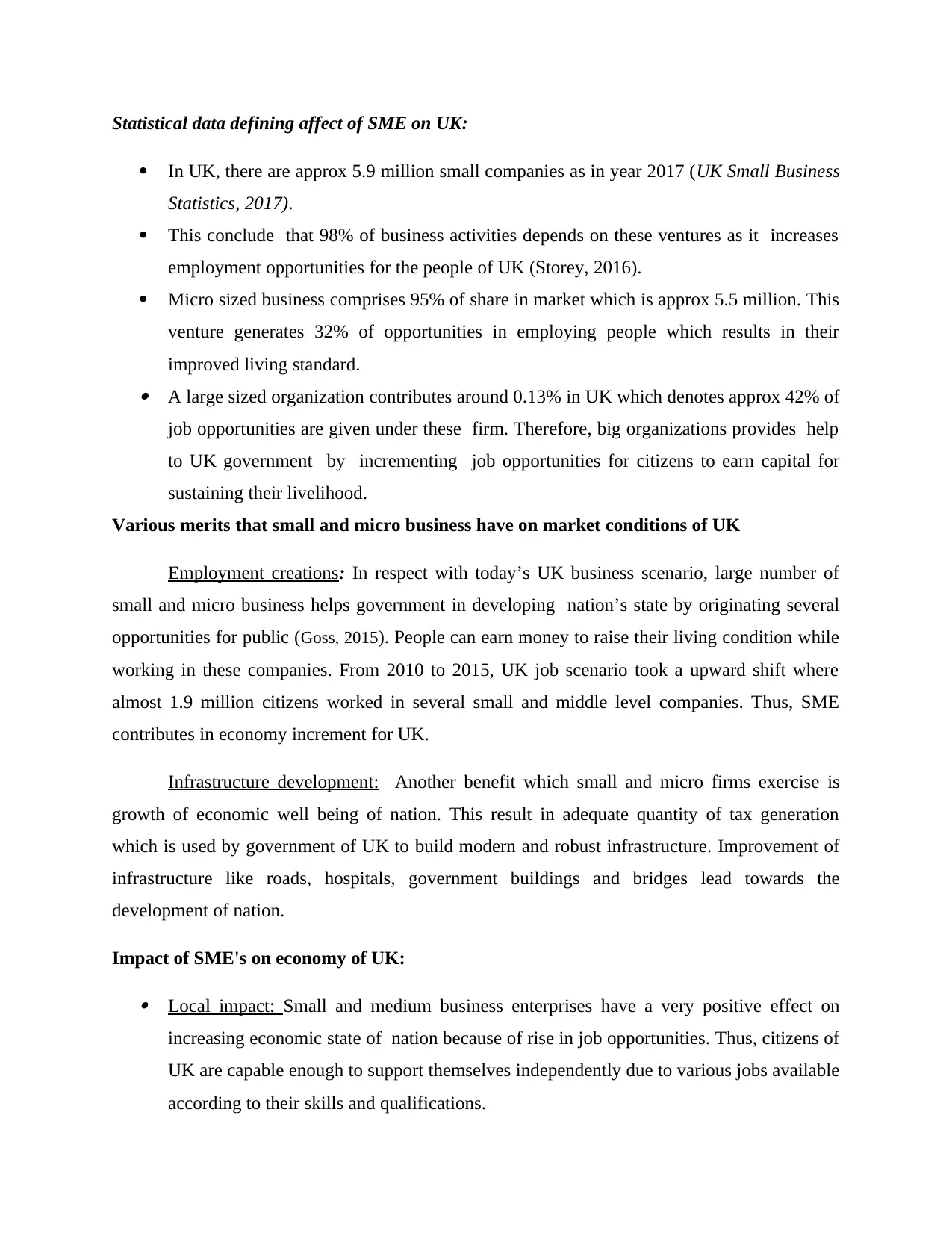
Statistical data defining affect of SME on UK:
In UK, there are approx 5.9 million small companies as in year 2017 (UK Small Business
Statistics, 2017).
This conclude that 98% of business activities depends on these ventures as it increases
employment opportunities for the people of UK (Storey, 2016).
Micro sized business comprises 95% of share in market which is approx 5.5 million. This
venture generates 32% of opportunities in employing people which results in their
improved living standard. A large sized organization contributes around 0.13% in UK which denotes approx 42% of
job opportunities are given under these firm. Therefore, big organizations provides help
to UK government by incrementing job opportunities for citizens to earn capital for
sustaining their livelihood.
Various merits that small and micro business have on market conditions of UK
Employment creations: In respect with today’s UK business scenario, large number of
small and micro business helps government in developing nation’s state by originating several
opportunities for public (Goss, 2015). People can earn money to raise their living condition while
working in these companies. From 2010 to 2015, UK job scenario took a upward shift where
almost 1.9 million citizens worked in several small and middle level companies. Thus, SME
contributes in economy increment for UK.
Infrastructure development: Another benefit which small and micro firms exercise is
growth of economic well being of nation. This result in adequate quantity of tax generation
which is used by government of UK to build modern and robust infrastructure. Improvement of
infrastructure like roads, hospitals, government buildings and bridges lead towards the
development of nation.
Impact of SME's on economy of UK:
Local impact: Small and medium business enterprises have a very positive effect on
increasing economic state of nation because of rise in job opportunities. Thus, citizens of
UK are capable enough to support themselves independently due to various jobs available
according to their skills and qualifications.
In UK, there are approx 5.9 million small companies as in year 2017 (UK Small Business
Statistics, 2017).
This conclude that 98% of business activities depends on these ventures as it increases
employment opportunities for the people of UK (Storey, 2016).
Micro sized business comprises 95% of share in market which is approx 5.5 million. This
venture generates 32% of opportunities in employing people which results in their
improved living standard. A large sized organization contributes around 0.13% in UK which denotes approx 42% of
job opportunities are given under these firm. Therefore, big organizations provides help
to UK government by incrementing job opportunities for citizens to earn capital for
sustaining their livelihood.
Various merits that small and micro business have on market conditions of UK
Employment creations: In respect with today’s UK business scenario, large number of
small and micro business helps government in developing nation’s state by originating several
opportunities for public (Goss, 2015). People can earn money to raise their living condition while
working in these companies. From 2010 to 2015, UK job scenario took a upward shift where
almost 1.9 million citizens worked in several small and middle level companies. Thus, SME
contributes in economy increment for UK.
Infrastructure development: Another benefit which small and micro firms exercise is
growth of economic well being of nation. This result in adequate quantity of tax generation
which is used by government of UK to build modern and robust infrastructure. Improvement of
infrastructure like roads, hospitals, government buildings and bridges lead towards the
development of nation.
Impact of SME's on economy of UK:
Local impact: Small and medium business enterprises have a very positive effect on
increasing economic state of nation because of rise in job opportunities. Thus, citizens of
UK are capable enough to support themselves independently due to various jobs available
according to their skills and qualifications.
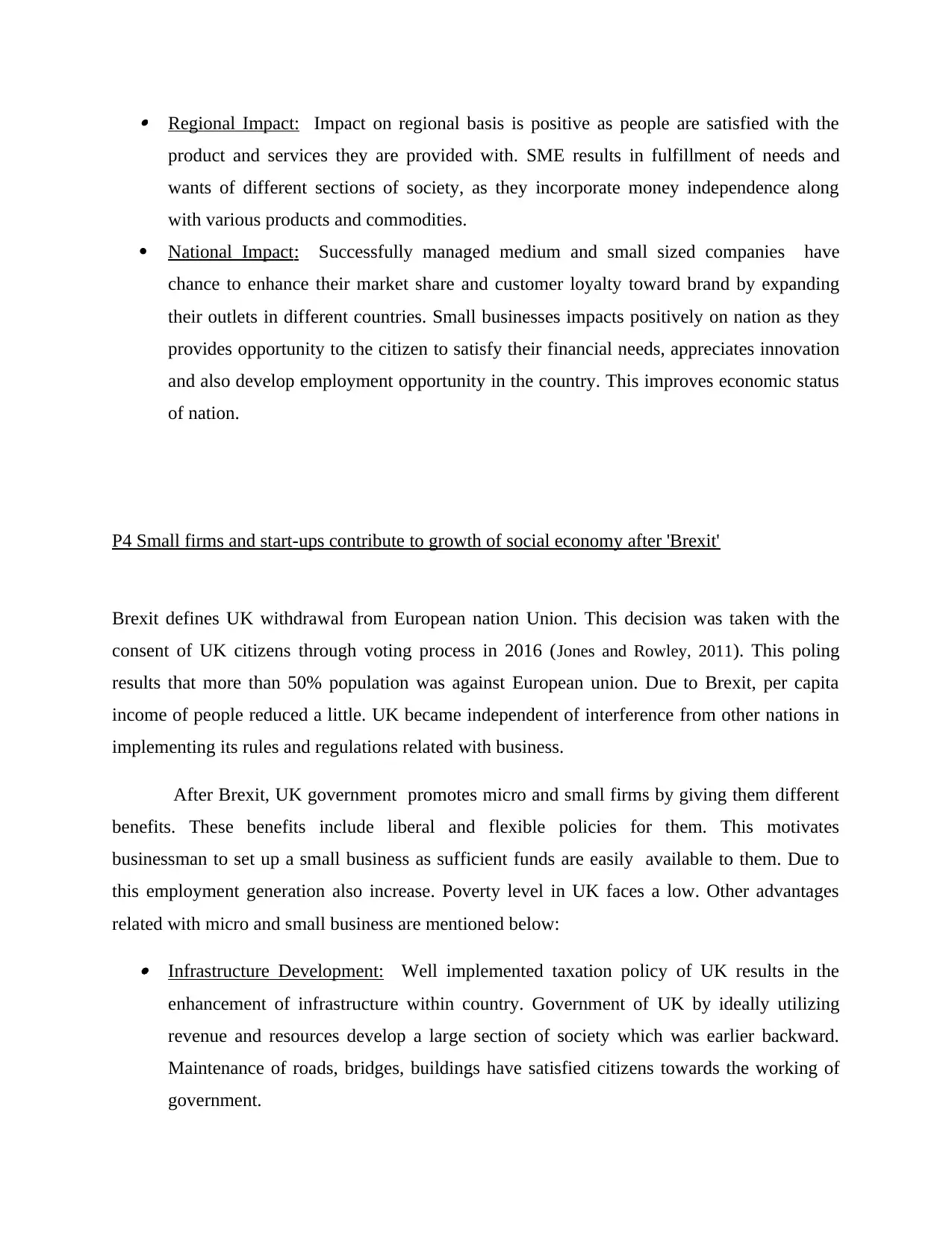
Regional Impact: Impact on regional basis is positive as people are satisfied with the
product and services they are provided with. SME results in fulfillment of needs and
wants of different sections of society, as they incorporate money independence along
with various products and commodities.
National Impact: Successfully managed medium and small sized companies have
chance to enhance their market share and customer loyalty toward brand by expanding
their outlets in different countries. Small businesses impacts positively on nation as they
provides opportunity to the citizen to satisfy their financial needs, appreciates innovation
and also develop employment opportunity in the country. This improves economic status
of nation.
P4 Small firms and start-ups contribute to growth of social economy after 'Brexit'
Brexit defines UK withdrawal from European nation Union. This decision was taken with the
consent of UK citizens through voting process in 2016 (Jones and Rowley, 2011). This poling
results that more than 50% population was against European union. Due to Brexit, per capita
income of people reduced a little. UK became independent of interference from other nations in
implementing its rules and regulations related with business.
After Brexit, UK government promotes micro and small firms by giving them different
benefits. These benefits include liberal and flexible policies for them. This motivates
businessman to set up a small business as sufficient funds are easily available to them. Due to
this employment generation also increase. Poverty level in UK faces a low. Other advantages
related with micro and small business are mentioned below:
Infrastructure Development: Well implemented taxation policy of UK results in the
enhancement of infrastructure within country. Government of UK by ideally utilizing
revenue and resources develop a large section of society which was earlier backward.
Maintenance of roads, bridges, buildings have satisfied citizens towards the working of
government.
product and services they are provided with. SME results in fulfillment of needs and
wants of different sections of society, as they incorporate money independence along
with various products and commodities.
National Impact: Successfully managed medium and small sized companies have
chance to enhance their market share and customer loyalty toward brand by expanding
their outlets in different countries. Small businesses impacts positively on nation as they
provides opportunity to the citizen to satisfy their financial needs, appreciates innovation
and also develop employment opportunity in the country. This improves economic status
of nation.
P4 Small firms and start-ups contribute to growth of social economy after 'Brexit'
Brexit defines UK withdrawal from European nation Union. This decision was taken with the
consent of UK citizens through voting process in 2016 (Jones and Rowley, 2011). This poling
results that more than 50% population was against European union. Due to Brexit, per capita
income of people reduced a little. UK became independent of interference from other nations in
implementing its rules and regulations related with business.
After Brexit, UK government promotes micro and small firms by giving them different
benefits. These benefits include liberal and flexible policies for them. This motivates
businessman to set up a small business as sufficient funds are easily available to them. Due to
this employment generation also increase. Poverty level in UK faces a low. Other advantages
related with micro and small business are mentioned below:
Infrastructure Development: Well implemented taxation policy of UK results in the
enhancement of infrastructure within country. Government of UK by ideally utilizing
revenue and resources develop a large section of society which was earlier backward.
Maintenance of roads, bridges, buildings have satisfied citizens towards the working of
government.
⊘ This is a preview!⊘
Do you want full access?
Subscribe today to unlock all pages.

Trusted by 1+ million students worldwide
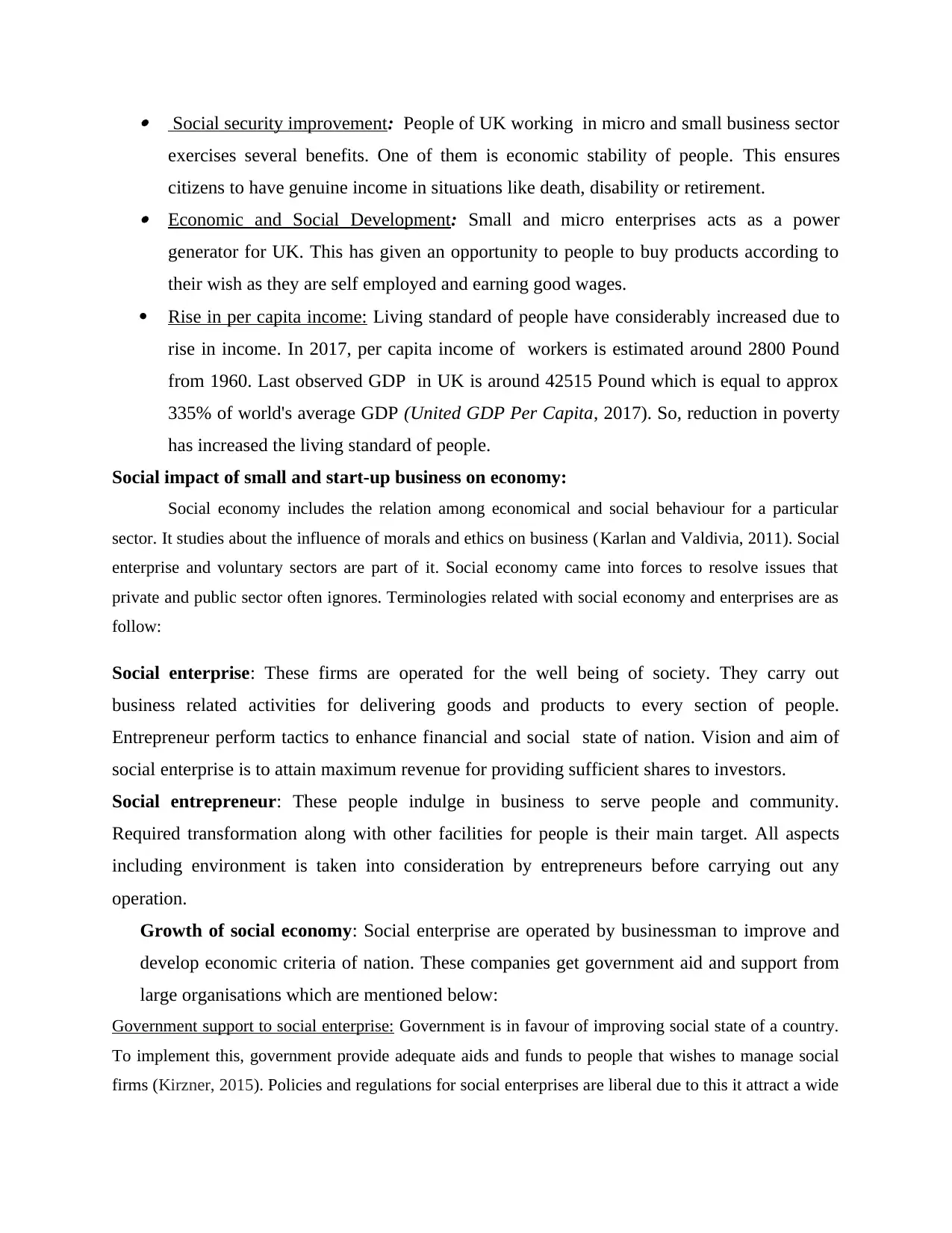
Social security improvement: People of UK working in micro and small business sector
exercises several benefits. One of them is economic stability of people. This ensures
citizens to have genuine income in situations like death, disability or retirement. Economic and Social Development: Small and micro enterprises acts as a power
generator for UK. This has given an opportunity to people to buy products according to
their wish as they are self employed and earning good wages.
Rise in per capita income: Living standard of people have considerably increased due to
rise in income. In 2017, per capita income of workers is estimated around 2800 Pound
from 1960. Last observed GDP in UK is around 42515 Pound which is equal to approx
335% of world's average GDP (United GDP Per Capita, 2017). So, reduction in poverty
has increased the living standard of people.
Social impact of small and start-up business on economy:
Social economy includes the relation among economical and social behaviour for a particular
sector. It studies about the influence of morals and ethics on business (Karlan and Valdivia, 2011). Social
enterprise and voluntary sectors are part of it. Social economy came into forces to resolve issues that
private and public sector often ignores. Terminologies related with social economy and enterprises are as
follow:
Social enterprise: These firms are operated for the well being of society. They carry out
business related activities for delivering goods and products to every section of people.
Entrepreneur perform tactics to enhance financial and social state of nation. Vision and aim of
social enterprise is to attain maximum revenue for providing sufficient shares to investors.
Social entrepreneur: These people indulge in business to serve people and community.
Required transformation along with other facilities for people is their main target. All aspects
including environment is taken into consideration by entrepreneurs before carrying out any
operation.
Growth of social economy: Social enterprise are operated by businessman to improve and
develop economic criteria of nation. These companies get government aid and support from
large organisations which are mentioned below:
Government support to social enterprise: Government is in favour of improving social state of a country.
To implement this, government provide adequate aids and funds to people that wishes to manage social
firms (Kirzner, 2015). Policies and regulations for social enterprises are liberal due to this it attract a wide
exercises several benefits. One of them is economic stability of people. This ensures
citizens to have genuine income in situations like death, disability or retirement. Economic and Social Development: Small and micro enterprises acts as a power
generator for UK. This has given an opportunity to people to buy products according to
their wish as they are self employed and earning good wages.
Rise in per capita income: Living standard of people have considerably increased due to
rise in income. In 2017, per capita income of workers is estimated around 2800 Pound
from 1960. Last observed GDP in UK is around 42515 Pound which is equal to approx
335% of world's average GDP (United GDP Per Capita, 2017). So, reduction in poverty
has increased the living standard of people.
Social impact of small and start-up business on economy:
Social economy includes the relation among economical and social behaviour for a particular
sector. It studies about the influence of morals and ethics on business (Karlan and Valdivia, 2011). Social
enterprise and voluntary sectors are part of it. Social economy came into forces to resolve issues that
private and public sector often ignores. Terminologies related with social economy and enterprises are as
follow:
Social enterprise: These firms are operated for the well being of society. They carry out
business related activities for delivering goods and products to every section of people.
Entrepreneur perform tactics to enhance financial and social state of nation. Vision and aim of
social enterprise is to attain maximum revenue for providing sufficient shares to investors.
Social entrepreneur: These people indulge in business to serve people and community.
Required transformation along with other facilities for people is their main target. All aspects
including environment is taken into consideration by entrepreneurs before carrying out any
operation.
Growth of social economy: Social enterprise are operated by businessman to improve and
develop economic criteria of nation. These companies get government aid and support from
large organisations which are mentioned below:
Government support to social enterprise: Government is in favour of improving social state of a country.
To implement this, government provide adequate aids and funds to people that wishes to manage social
firms (Kirzner, 2015). Policies and regulations for social enterprises are liberal due to this it attract a wide
Paraphrase This Document
Need a fresh take? Get an instant paraphrase of this document with our AI Paraphraser
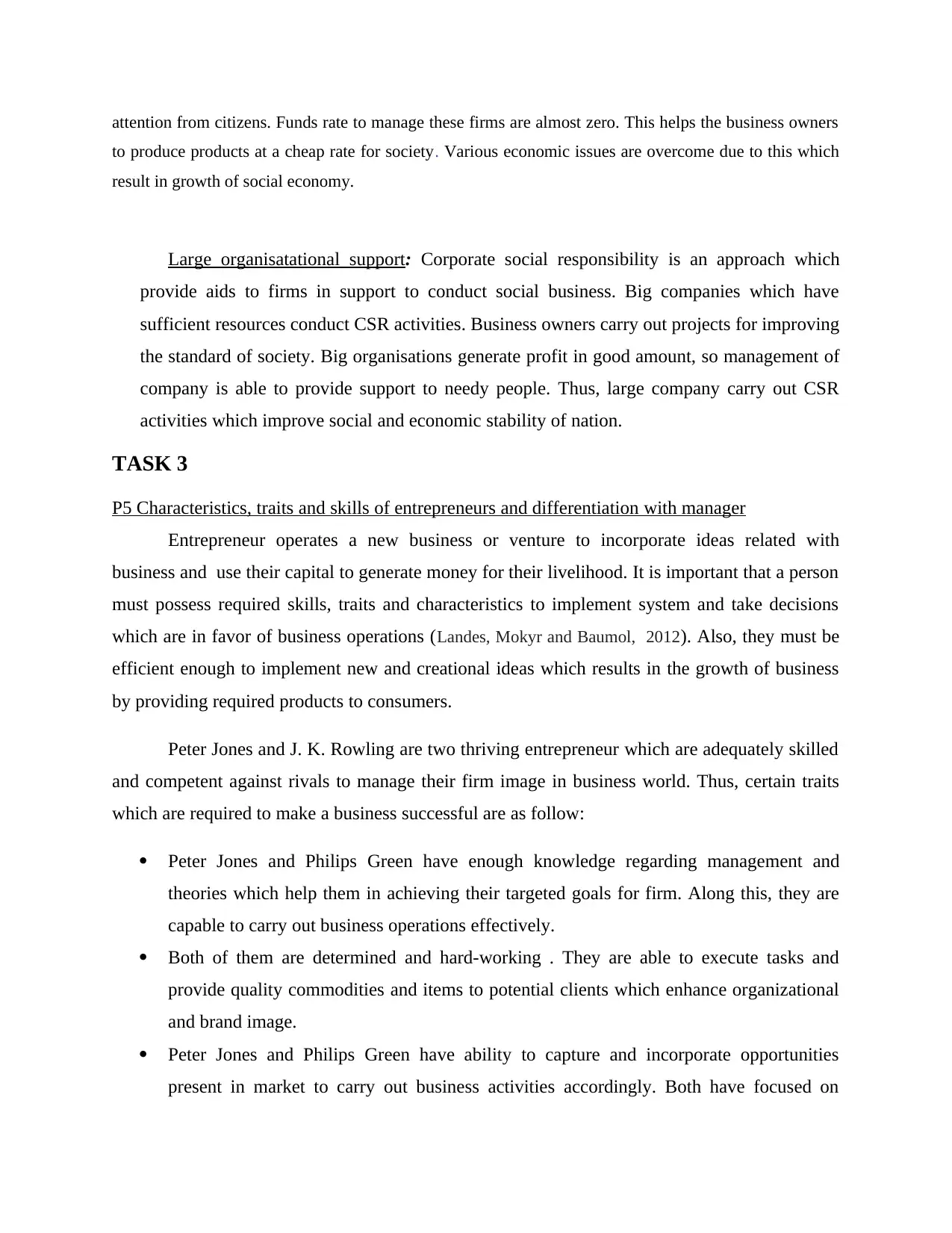
attention from citizens. Funds rate to manage these firms are almost zero. This helps the business owners
to produce products at a cheap rate for society. Various economic issues are overcome due to this which
result in growth of social economy.
Large organisatational support: Corporate social responsibility is an approach which
provide aids to firms in support to conduct social business. Big companies which have
sufficient resources conduct CSR activities. Business owners carry out projects for improving
the standard of society. Big organisations generate profit in good amount, so management of
company is able to provide support to needy people. Thus, large company carry out CSR
activities which improve social and economic stability of nation.
TASK 3
P5 Characteristics, traits and skills of entrepreneurs and differentiation with manager
Entrepreneur operates a new business or venture to incorporate ideas related with
business and use their capital to generate money for their livelihood. It is important that a person
must possess required skills, traits and characteristics to implement system and take decisions
which are in favor of business operations (Landes, Mokyr and Baumol, 2012). Also, they must be
efficient enough to implement new and creational ideas which results in the growth of business
by providing required products to consumers.
Peter Jones and J. K. Rowling are two thriving entrepreneur which are adequately skilled
and competent against rivals to manage their firm image in business world. Thus, certain traits
which are required to make a business successful are as follow:
Peter Jones and Philips Green have enough knowledge regarding management and
theories which help them in achieving their targeted goals for firm. Along this, they are
capable to carry out business operations effectively.
Both of them are determined and hard-working . They are able to execute tasks and
provide quality commodities and items to potential clients which enhance organizational
and brand image.
Peter Jones and Philips Green have ability to capture and incorporate opportunities
present in market to carry out business activities accordingly. Both have focused on
to produce products at a cheap rate for society. Various economic issues are overcome due to this which
result in growth of social economy.
Large organisatational support: Corporate social responsibility is an approach which
provide aids to firms in support to conduct social business. Big companies which have
sufficient resources conduct CSR activities. Business owners carry out projects for improving
the standard of society. Big organisations generate profit in good amount, so management of
company is able to provide support to needy people. Thus, large company carry out CSR
activities which improve social and economic stability of nation.
TASK 3
P5 Characteristics, traits and skills of entrepreneurs and differentiation with manager
Entrepreneur operates a new business or venture to incorporate ideas related with
business and use their capital to generate money for their livelihood. It is important that a person
must possess required skills, traits and characteristics to implement system and take decisions
which are in favor of business operations (Landes, Mokyr and Baumol, 2012). Also, they must be
efficient enough to implement new and creational ideas which results in the growth of business
by providing required products to consumers.
Peter Jones and J. K. Rowling are two thriving entrepreneur which are adequately skilled
and competent against rivals to manage their firm image in business world. Thus, certain traits
which are required to make a business successful are as follow:
Peter Jones and Philips Green have enough knowledge regarding management and
theories which help them in achieving their targeted goals for firm. Along this, they are
capable to carry out business operations effectively.
Both of them are determined and hard-working . They are able to execute tasks and
provide quality commodities and items to potential clients which enhance organizational
and brand image.
Peter Jones and Philips Green have ability to capture and incorporate opportunities
present in market to carry out business activities accordingly. Both have focused on
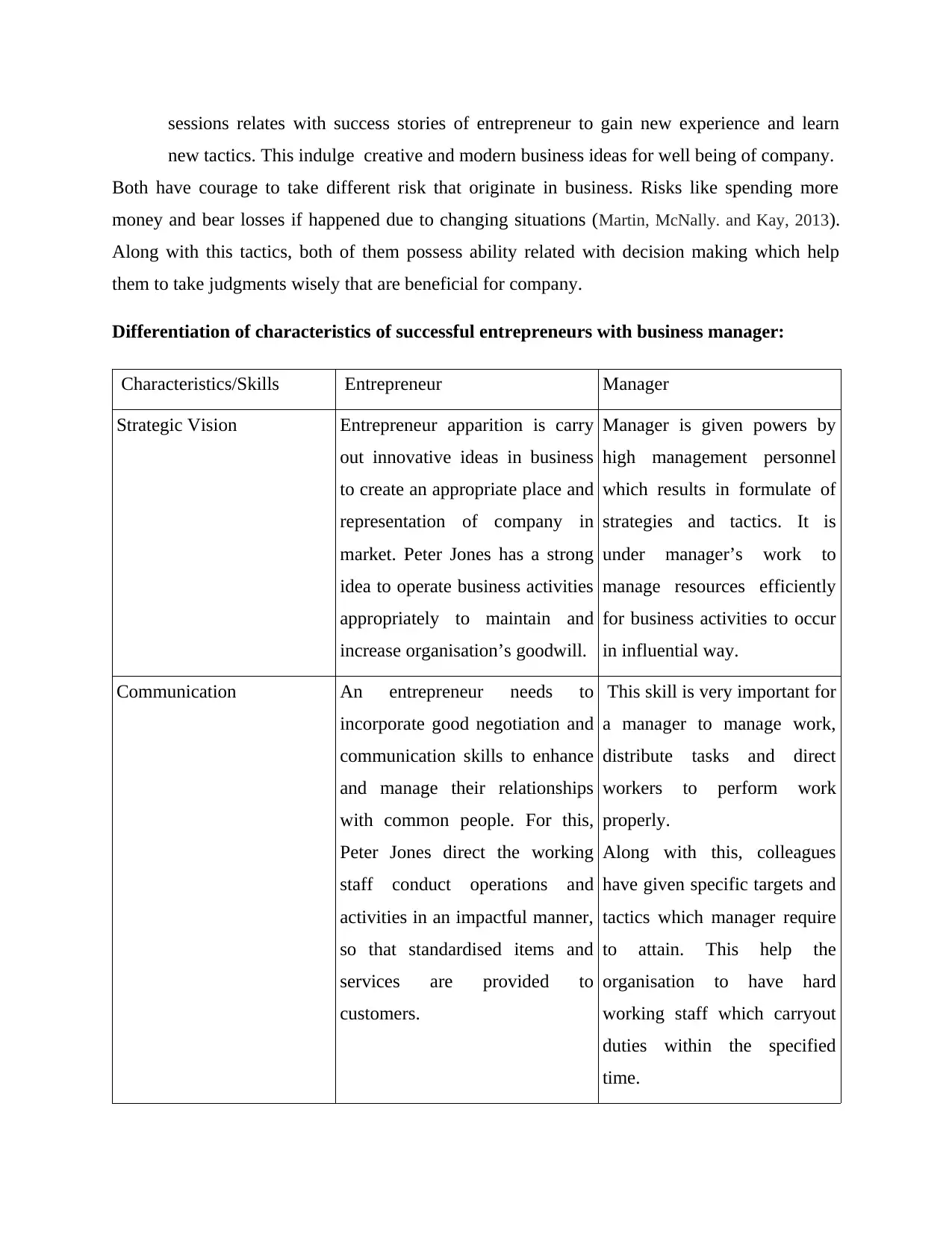
sessions relates with success stories of entrepreneur to gain new experience and learn
new tactics. This indulge creative and modern business ideas for well being of company.
Both have courage to take different risk that originate in business. Risks like spending more
money and bear losses if happened due to changing situations (Martin, McNally. and Kay, 2013).
Along with this tactics, both of them possess ability related with decision making which help
them to take judgments wisely that are beneficial for company.
Differentiation of characteristics of successful entrepreneurs with business manager:
Characteristics/Skills Entrepreneur Manager
Strategic Vision Entrepreneur apparition is carry
out innovative ideas in business
to create an appropriate place and
representation of company in
market. Peter Jones has a strong
idea to operate business activities
appropriately to maintain and
increase organisation’s goodwill.
Manager is given powers by
high management personnel
which results in formulate of
strategies and tactics. It is
under manager’s work to
manage resources efficiently
for business activities to occur
in influential way.
Communication An entrepreneur needs to
incorporate good negotiation and
communication skills to enhance
and manage their relationships
with common people. For this,
Peter Jones direct the working
staff conduct operations and
activities in an impactful manner,
so that standardised items and
services are provided to
customers.
This skill is very important for
a manager to manage work,
distribute tasks and direct
workers to perform work
properly.
Along with this, colleagues
have given specific targets and
tactics which manager require
to attain. This help the
organisation to have hard
working staff which carryout
duties within the specified
time.
new tactics. This indulge creative and modern business ideas for well being of company.
Both have courage to take different risk that originate in business. Risks like spending more
money and bear losses if happened due to changing situations (Martin, McNally. and Kay, 2013).
Along with this tactics, both of them possess ability related with decision making which help
them to take judgments wisely that are beneficial for company.
Differentiation of characteristics of successful entrepreneurs with business manager:
Characteristics/Skills Entrepreneur Manager
Strategic Vision Entrepreneur apparition is carry
out innovative ideas in business
to create an appropriate place and
representation of company in
market. Peter Jones has a strong
idea to operate business activities
appropriately to maintain and
increase organisation’s goodwill.
Manager is given powers by
high management personnel
which results in formulate of
strategies and tactics. It is
under manager’s work to
manage resources efficiently
for business activities to occur
in influential way.
Communication An entrepreneur needs to
incorporate good negotiation and
communication skills to enhance
and manage their relationships
with common people. For this,
Peter Jones direct the working
staff conduct operations and
activities in an impactful manner,
so that standardised items and
services are provided to
customers.
This skill is very important for
a manager to manage work,
distribute tasks and direct
workers to perform work
properly.
Along with this, colleagues
have given specific targets and
tactics which manager require
to attain. This help the
organisation to have hard
working staff which carryout
duties within the specified
time.
⊘ This is a preview!⊘
Do you want full access?
Subscribe today to unlock all pages.

Trusted by 1+ million students worldwide
1 out of 19
Related Documents
Your All-in-One AI-Powered Toolkit for Academic Success.
+13062052269
info@desklib.com
Available 24*7 on WhatsApp / Email
![[object Object]](/_next/static/media/star-bottom.7253800d.svg)
Unlock your academic potential
Copyright © 2020–2026 A2Z Services. All Rights Reserved. Developed and managed by ZUCOL.




